四种时态对比练习
- 格式:doc
- 大小:22.50 KB
- 文档页数:1
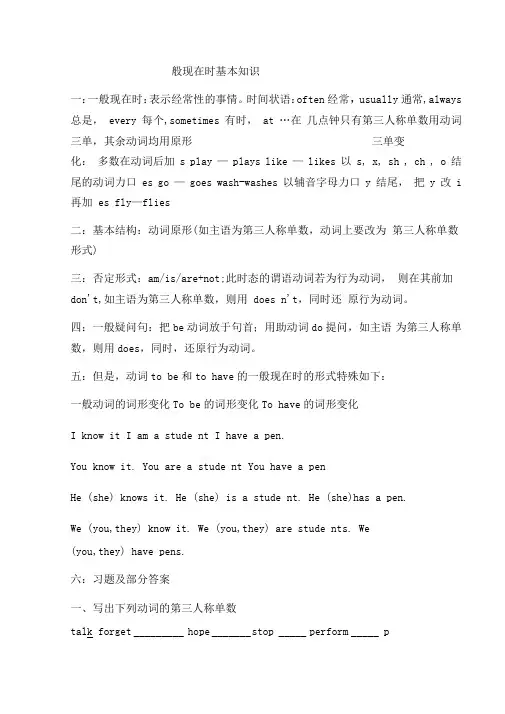
般现在时基本知识一:一般现在时:表示经常性的事情。
时间状语:often经常,usually 通常,always 总是, every 每个,sometimes 有时, at …在几点钟只有第三人称单数用动词三单,其余动词均用原形三单变化:多数在动词后加 s play — plays like — likes 以 s, x, sh , ch , o 结尾的动词力口 es go — goes wash-washes 以辅音字母力口 y 结尾,把 y 改 i 再加 es fly—flies二:基本结构:动词原形(如主语为第三人称单数,动词上要改为第三人称单数形式)三:否定形式:am/is/are+not;此时态的谓语动词若为行为动词,则在其前加don't,如主语为第三人称单数,则用 does n't,同时还原行为动词。
四:一般疑问句:把be动词放于句首;用助动词do提问,如主语为第三人称单数,则用does,同时,还原行为动词。
五:但是,动词to be和to have的一般现在时的形式特殊如下:一般动词的词形变化To be的词形变化To have的词形变化I know it I am a stude nt I have a pen.You know it. You are a stude nt You have a penHe (she) knows it. He (she) is a stude nt. He (she)has a pen.We (you,they) know it. We (you,they) are stude nts. We(you,they) have pens.六:习题及部分答案一、写出下列动词的第三人称单数talk forget _________ hope _______ s top _____ perform _____ play ______ s ay ______buy ______ w orry _____ fly _____ study _______ like ______ m ake _____take ______love ______ recite ______ become ________ come _______ drive ______shine _______leave ____ w ake ________ r ide ______ write ______ hike _____ give ___see ______ s wim ______ stop ______ s hop_______ plan ______ g et ______sit ______ l et ______cut _______ run ______ forget ______ begin ______ wash _____ watch_finish ____ teach ____ fish _______ r each _______ go ______ do _____ 二、用括号动词的适当形式填空。
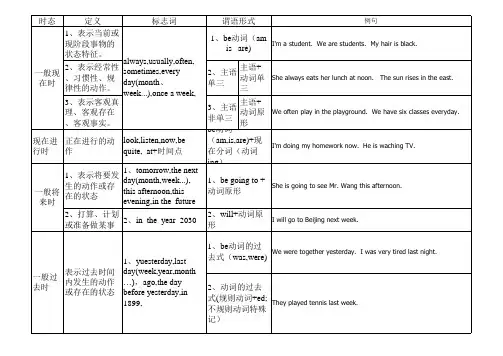
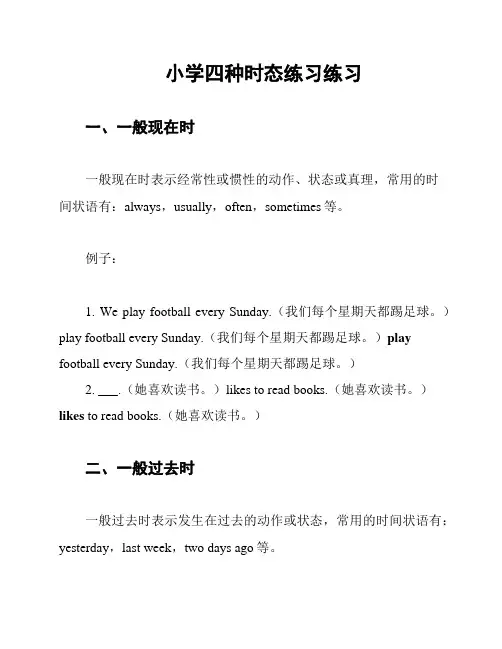
小学四种时态练习练习一、一般现在时一般现在时表示经常性或惯性的动作、状态或真理,常用的时间状语有:always,usually,often,sometimes等。
例子:1. We play football every Sunday.(我们每个星期天都踢足球。
)play football every Sunday.(我们每个星期天都踢足球。
)play football every Sunday.(我们每个星期天都踢足球。
)2. ___.(她喜欢读书。
)likes to read books.(她喜欢读书。
)likes to read books.(她喜欢读书。
)二、一般过去时一般过去时表示发生在过去的动作或状态,常用的时间状语有:yesterday,last week,two days ago等。
例子:1. ___.(昨天我们参观了博物馆。
)visited the museum yesterday.(昨天我们参观了博物馆。
)visited the museum yesterday.(昨天我们参观了博物馆。
)2. ___.(他昨晚完成了他的家庭作业。
)finished his homework last night.(他昨晚完成了他的家庭作业。
)finished his homework last night.(他昨晚完成了他的家庭作业。
)三、一般将来时一般将来时表示将要发生的动作或状态,常用的时间状语有:tomorrow,next week,in the future等。
例子:1. I will take a trip next month.(我下个月将要进行一次旅行。
)will take a trip next month.(我下个月将要进行一次旅行。
)willtake a trip next month.(我下个月将要进行一次旅行。
)2. She is going to study abroad in the future.(她将来要出国留学。
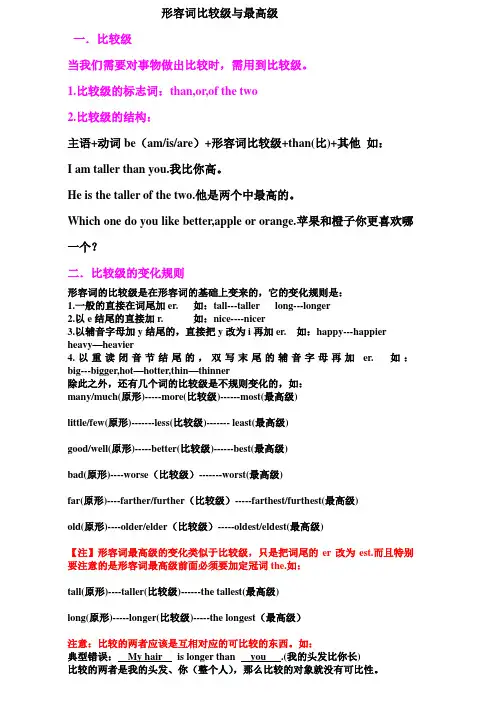
形容词比较级与最高级一.比较级当我们需要对事物做出比较时,需用到比较级。
1.比较级的标志词:than,or,of the two2.比较级的结构:主语+动词be(am/is/are)+形容词比较级+than(比)+其他如:I am taller than you.我比你高。
He is the taller of the two.他是两个中最高的。
Which one do you like better,apple or orange.苹果和橙子你更喜欢哪一个?二.比较级的变化规则形容词的比较级是在形容词的基础上变来的,它的变化规则是:1.一般的直接在词尾加er. 如:tall---taller long---longer2.以e结尾的直接加r. 如:nice----nicer3.以辅音字母加y结尾的,直接把y改为i再加er. 如:happy---happier heavy—heavier4.以重读闭音节结尾的,双写末尾的辅音字母再加er. 如:big---bigger,hot—hotter,thin—thinner除此之外,还有几个词的比较级是不规则变化的,如:many/much(原形)-----more(比较级)------most(最高级)little/few(原形)-------less(比较级)------- least(最高级)good/well(原形)-----better(比较级)------best(最高级)bad(原形)----worse(比较级)-------worst(最高级)far(原形)----farther/further(比较级)-----farthest/furthest(最高级)old(原形)----older/elder(比较级)-----oldest/eldest(最高级)【注】形容词最高级的变化类似于比较级,只是把词尾的er改为est.而且特别要注意的是形容词最高级前面必须要加定冠词the.如:tall(原形)----taller(比较级)------the tallest(最高级)long(原形)-----longer(比较级)-----the longest(最高级)注意:比较的两者应该是互相对应的可比较的东西。
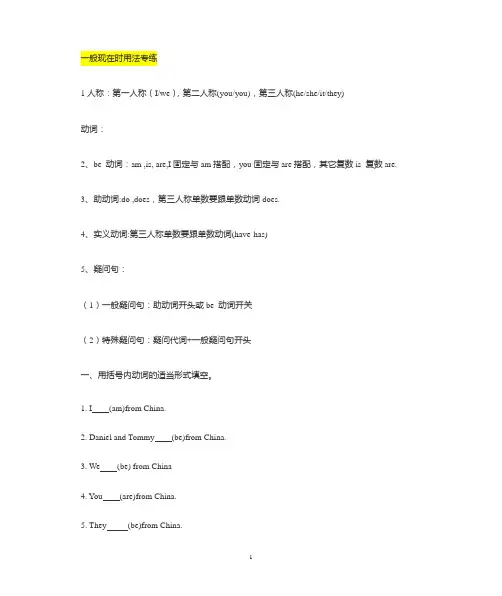
一般现在时用法专练1人称:第一人称(I/we),第二人称(you/you),第三人称(he/she/it/they)动词:2、be 动词:am ,is, are,I固定与am搭配,you固定与are搭配,其它复数is 复数are.3、助动词:do ,does,第三人称单数要跟单数动词does.4、实义动词:第三人称单数要跟单数动词(have-has)5、疑问句:(1)一般疑问句:助动词开头或be 动词开关(2)特殊疑问句:疑问代词+一般疑问句开头一、用括号内动词的适当形式填空。
1. I (am)from China.2. Daniel and Tommy (be)from China.3. We (be) from China4. You (are)from China.5. They (be)from China.6. I (come)from China.7. Daniel and Tommy (come) from China.8. He (come)from China9. You (come)from China.10. They (come)China.11、_______(do)you come from China?12、__________(do)he come from China.13、________(be)you a student.14、________(be)he a student.15、、Where______(do)you come from ?15、Where__________(do)he come from ?16、Where________(be)you from?.17、Where_______(be)he from?二、按照要求改写句子1. Daniel watches TV every evening.(改为否定句)2. I do my homework every day.(改为一般疑问句,作否定回答)3. She likes milk.(改为一般疑问句,作肯定回答)4. Amy likes playing computer games.(改为一般疑问句,作否定回答)5. We go to school every morning.(改为否定句)6. He speaks English very well.(改为否定句)7. I like taking photos in the park.(对划线部分提问)8. John comes from Canada.(对划线部分提问)9. She is always a good student.(改为一般疑问句,作否定回答)10. Simon and Daniel like going skating.(改为否定句)一般将来时专项练习二、几个用将来时的向征In the future,next ,in a week,tomorrow.,soon三、动词填空。
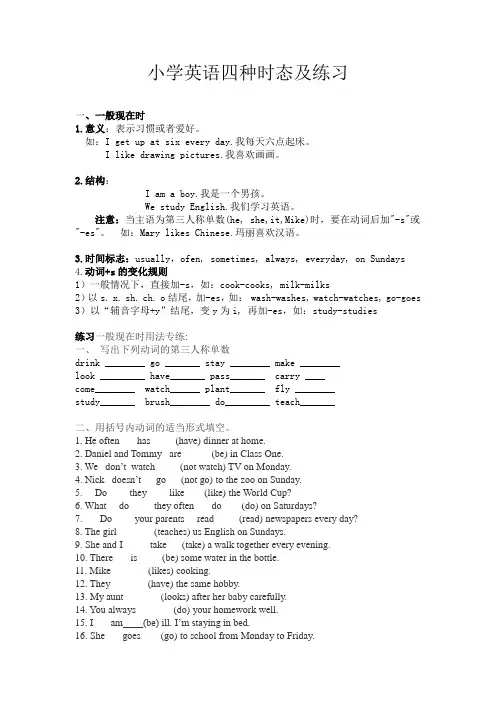
小学英语四种时态及练习一、一般现在时1.意义:表示习惯或者爱好。
如:I get up at six every day.我每天六点起床。
I like drawing pictures.我喜欢画画。
2.结构:I am a boy.我是一个男孩。
We study English.我们学习英语。
注意:当主语为第三人称单数(he, she,it,Mike)时,要在动词后加"-s"或"-es"。
如:Mary likes Chinese.玛丽喜欢汉语。
3.时间标志:usually,ofen, sometimes, always, everyday, on Sundays4.动词+s的变化规则1)一般情况下,直接加-s,如:cook-cooks, milk-milks2)以s. x. sh. ch. o结尾,加-es,如: wash-washes, watch-watches, go-goes 3)以“辅音字母+y”结尾,变y为i, 再加-es,如:study-studies练习一般现在时用法专练:一、写出下列动词的第三人称单数drink ________ go _______ stay ________ make ________look _________ have_______ pass_______ carry ____come________ watch______ plant_______ fly ________study_______ brush________ do_________ teach_______二、用括号内动词的适当形式填空。
1. He often ___has_____(have) dinner at home.2. Daniel and Tommy _are______(be) in Class One.3. We _don’t_watch_____(not watch) TV on Monday.4. Nick _doesn’t___go___(not go) to the zoo on Sunday.5. __Do____ they ____like____(like) the World Cup?6. What __do_____they often ___do____(do) on Saturdays?7. ___Do____ your parents __read_____(read) newspapers every day?8. The girl _______(teaches) us English on Sundays.9. She and I _____take___(take) a walk together every evening.10. There ___is_____(be) some water in the bottle.11. Mike _______(likes) cooking.12. They _______(have) the same hobby.13. My aunt _______(looks) after her baby carefully.14. You always _______(do) your homework well.15. I ___am____(be) ill. I’m staying in bed.16. She ___goes____(go) to school from Monday to Friday.17. Liu Tao ___does____(do) not like PE.18. The child often _______(watches) TV in the evening.19. Su Hai and Su Yang _______(have) eight lessons this term.20. -What day ____is___(be) it today?-It’s Saturday.三、按照要求改写句子1. Daniel watches TV every evening.(改为否定句)______________________________________________________2.I do my homework every day.(改为一般疑问句,作否定回答)____________________________________________________3. She likes milk.(改为一般疑问句,作肯定回答)_______________________________________________________4. Amy likes playing computer games. (改为一般疑问句,作否定回答)___________________________________________________5. We don’t go to school every morning.(改为肯定句)_______________________________________________________6. He doesn’t speak English very well.(改为肯定句)_____________________________________________________7. I like taking photos in the park.(对划线部分提问)_____________________________________________________8. John comes from Canada.(对划线部分提问)____________________________________________________9. She is always a good student?(改为一般疑问句,作否定回答)________________________________________________________10. Simon and Daniel like going skating.(改为否定句)___________________________________________________五、改错(划出错误的地方,将正确的写在横线上)1. Is your brother speak English? __________________2. Does he likes going fishing? _________________3. He likes play games after class. __________________4. Mr. Wu teachs us English. __________________5. She don’t do her homework on Sundays. _________________二、现在进行时1.意义:现在进行时表示现在正在进行或发生的动作。
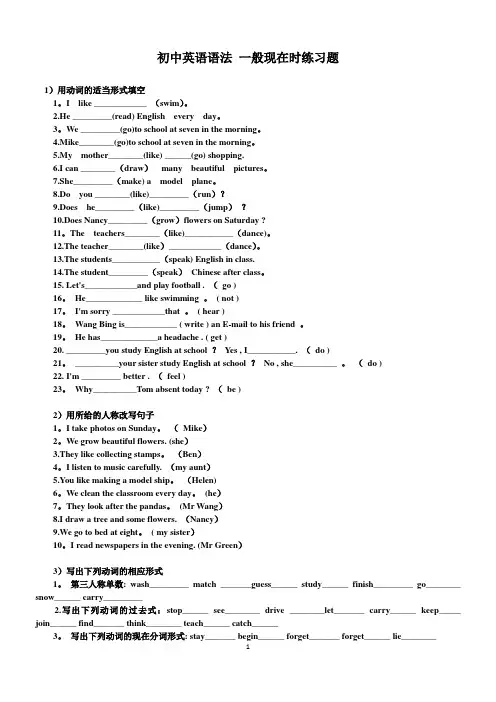
初中英语语法一般现在时练习题1)用动词的适当形式填空1。
I like ____________ (swim)。
2.He _________(read) English every day。
3。
We _________(go)to school at seven in the morning。
4.Mike________(go)to school at seven in the morning。
5.My mother________(like) ______(go) shopping.6.I can ________(draw)many beautiful pictures。
7.She_________(make) a model plane。
8.Do you ________(like)_________(run)?9.Does he_________(like)_________(jump)?10.Does Nancy_________(grow)flowers on Saturday ?11。
The teachers________(like)___________(dance)。
12.The teacher________(like)____________(dance)。
13.The students___________(speak) English in class.14.The student_________(speak)Chinese after class。
15. Let's____________and play football . (go )16。
He_____________ like swimming 。
( not )17。
I'm sorry ____________that 。
( hear )18。
Wang Bing is____________ ( write ) an E-mail to his friend 。
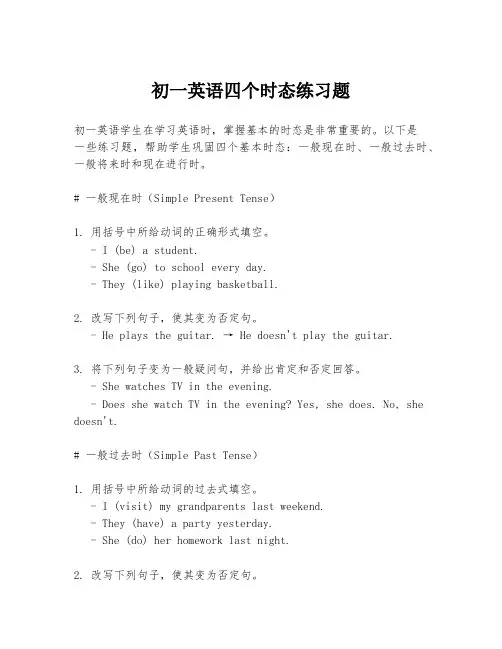
初一英语四个时态练习题初一英语学生在学习英语时,掌握基本的时态是非常重要的。
以下是一些练习题,帮助学生巩固四个基本时态:一般现在时、一般过去时、一般将来时和现在进行时。
# 一般现在时(Simple Present Tense)1. 用括号中所给动词的正确形式填空。
- I (be) a student.- She (go) to school every day.- They (like) playing basketball.2. 改写下列句子,使其变为否定句。
- He plays the guitar. → He doesn't play the guitar.3. 将下列句子变为一般疑问句,并给出肯定和否定回答。
- She watches TV in the evening.- Does she watch TV in the evening? Yes, she does. No, she doesn't.# 一般过去时(Simple Past Tense)1. 用括号中所给动词的过去式填空。
- I (visit) my grandparents last weekend.- They (have) a party yesterday.- She (do) her homework last night.2. 改写下列句子,使其变为否定句。
- We went to the park yesterday. → We didn't go to the park yesterday.3. 将下列句子变为一般疑问句,并给出肯定和否定回答。
- He read a book last night.- Did he read a book last night? Yes, he did. No, hedidn't.# 一般将来时(Simple Future Tense)1. 用括号中所给动词的正确形式填空。
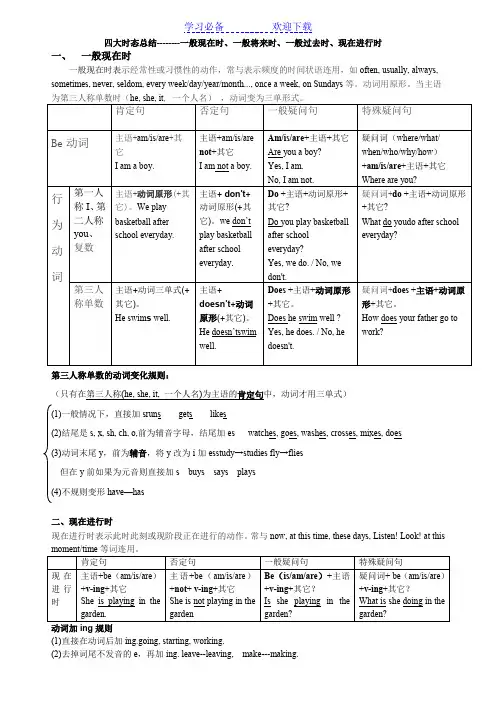
四大时态总结--------一般现在时、一般将来时、一般过去时、现在进行时一、一般现在时一般现在时表示经常性或习惯性的动作,常与表示频度的时间状语连用,如often, usually, always, sometimes, never, seldom, every week/day/year/month..., once a week, on Sundays等。
动词用原形。
当主语第三人称单数的动词变化规则:(只有在第三人称(he, she, it, 一个人名)为主语的肯定句中,动词才用三单式)(1)一般情况下,直接加sruns gets likes(2)结尾是s, x, sh, ch, o,前为辅音字母,结尾加es watches, goes, washes, crosses, mixes, does(3)动词末尾y,前为辅音,将y改为i加esstudy→studies fly→flies但在y前如果为元音则直接加s buys says plays(4)不规则变形have—has二、现在进行时现在进行时表示此时此刻或现阶段正在进行的动作。
常与now, at this time, these days, Listen! Look! at this动词加ing规则(1)直接在动词后加ing.going, starting, working.(2)去掉词尾不发音的e,再加ing. leave--leaving, make---making.注意:如果单词结尾的e发音,则不能去掉,也直接加ing. see –seeingagree - agreeing .(3) 对于动词只有一个元音,而其后跟了一个辅音字母时,双写末尾辅音字母再加ing.sitting, beginningrun – runningstop – stoppingcut – cuttingcontrol – controlling(4)以ie结尾,把ie变y再加ing。
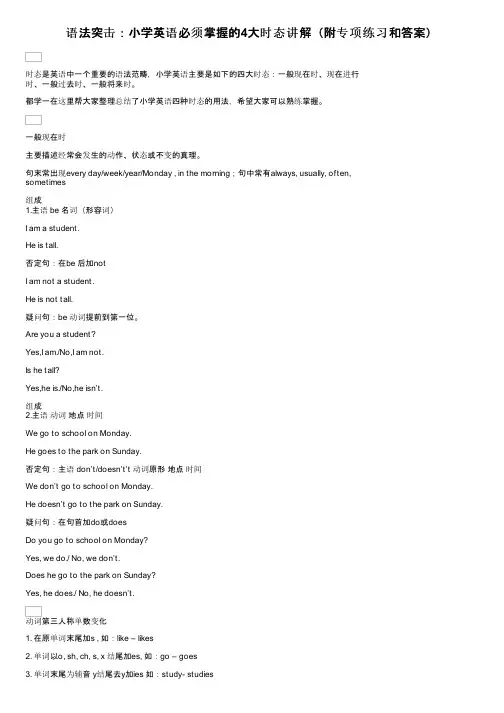
语法突击:小学英语必须掌握的4大时态讲解(附专项练习和答案)时态是英语中一个重要的语法范畴,小学英语主要是如下的四大时态:一般现在时、现在进行时、一般过去时、一般将来时。
都学一在这里帮大家整理总结了小学英语四种时态的用法,希望大家可以熟练掌握。
一般现在时主要描述经常会发生的动作、状态或不变的真理。
句末常出现every day/week/year/Monday , in the morning;句中常有always, usually, often,sometimes组成1.主语 be 名词(形容词)I am a student.He is tall.否定句:在be 后加notI am not a student.He is not tall.疑问句:be 动词提前到第一位。
Are you a student?Yes,I am./No,I am not.Is he tall?Yes,he is./No,he isn’t.组成2.主语动词地点时间We go to school on Monday.He goes to the park on Sunday.否定句:主语 don’t/doesn’t’t 动词原形地点时间We don’t go to school on Monday.He doesn’t go to the park on Sunday.疑问句:在句首加do或doesDo you go to school on Monday?Yes, we do./ No, we don’t.Does he go to the park on Sunday?Yes, he does./ No, he doesn’t.动词第三人称单数变化1. 在原单词末尾加s , 如:like – likes2. 单词以o, sh, ch, s, x 结尾加es, 如:go – goes3. 单词末尾为辅音 y结尾去y加ies 如:study- studies现在进行时主要叙述正在发生的事情。
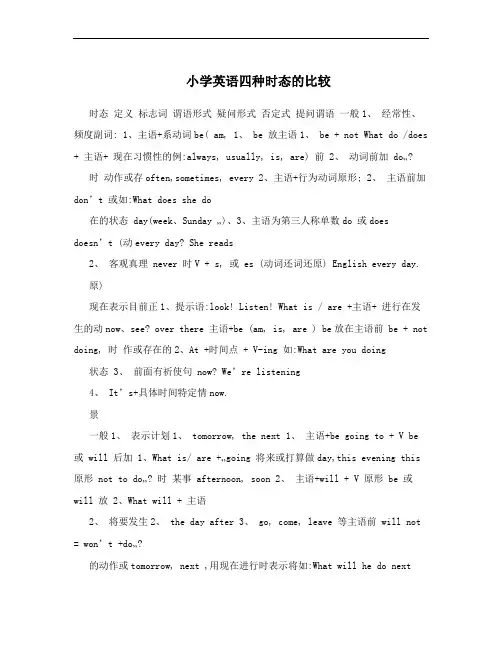
小学英语四种时态的比较时态定义标志词谓语形式疑问形式否定式提问谓语一般1、经常性、频度副词: 1、主语+系动词be( am, 1、 be 放主语1、 be + not What do /does + 主语+ 现在习惯性的例:always, usually, is, are) 前 2、动词前加do…?时动作或存often,sometimes, every 2、主语+行为动词原形; 2、主语前加don’t 或如:What does she do在的状态 day(week、Sun day …)、3、主语为第三人称单数do 或does doesn’t (动every day? She reads2、客观真理 never 时V + s, 或 es (动词还词还原) English every day.原)现在表示目前正1、提示语:look! Listen! What is / are +主语+ 进行在发生的动now、see? over there 主语+be (am, is, are ) be放在主语前 be + not doing, 时作或存在的2、At +时间点 + V-ing 如:What are you doing 状态 3、前面有祈使句now? We’re listening4、It’s+具体时间特定情now.景一般1、表示计划1、 tomorrow, the next 1、主语+be going to + V be 或 will 后加 1、What is/ are +…going 将来或打算做day,this evening this 原形not to do…? 时某事 afternoon, soon 2、主语+will + V 原形 be 或will 放 2、What will + 主语2、将要发生2、 the day after3、 go, come, leave 等主语前 will not = won’t +do…?的动作或tomorrow, next ,用现在进行时表示将如:What will he do next存在的状(week,term,month,yea来 week? He will play态r…) 4、 want 用一般现在时basketball next week.3、 in +未到年份,如in 表将来2008一般表示过去时1、 yesterday, last, 主语+动词be 的过去时1、 was / were 1、 was/ were + What did + 主语+ do…? 过去间内发生的(week,year,month…)(was, were) 放主语前 not 如:What did Tom do last 时动作或存在the day before 2、主语+行为动词的过去2、主语前加2、动词前加night? Tom did his的状态 yesterday,just now等式 did (动词didn’t (动词homework last night.2、two years ago/ at that 还原) 还原)time/ before等3、in +过去年份二、动词的变化规则。
四种过去时态的讲解及习题(一)一般过去时一、一般过去时1.一般过去时表示过去某个时间发生的动作或存在的状态,常和表示过去的时间状语连用。
一般过去时也表示过去经常或反复发生的动作。
2.Be动词在一般过去时中的变化:⑴am 和is在一般过去时中变为was。
(was not=wasn't)⑵are在一般过去时中变为were。
(were not=weren't)⑶带有was或were的句子,其否定、疑问的变化和is, am, are一样,即否定句在was或were后加not,一般疑问句把was或were调到句首。
3.句中没有be动词的一般过去时的句子否定句:didn't +动词原形,如:Jim went home yesterday.Jim didn't go home yesterday.一般疑问句:在句首加did,句子中的动词过去式变回原形。
如:Jim went home yesterday.Did Jim go home yesterday?特殊疑问句:⑴疑问词+一般疑问句?如:Jim went home yesterday.Did Jim go home yesterday?What did Jim do yesterday?动词过去式变化规则:1.一般在动词末尾加-ed,如:pull-pulled, cook-cooked2.结尾是e加d,如:taste-tasted3.末尾是辅音字母加一个元音字母和一个辅音字母的重读闭音节,应双写末尾的辅音字母,再加-ed,如:stop-stopped4.以“辅音字母+y”结尾的,变y为i,再加-ed,如:study-studied5.不规则动词过去式:一般过去时练习Be动词的过去时练习(1)一、用be动词的适当形式填空1.I _______ at school just now.2.He ________ at the camp last week.3.We ________ students two years ago.4.They ________ on the farm a moment ago.5.Yang Ling ________ eleven years old last year.6.There ________ an apple on the plate yesterday.7.There ________ some milk in the fridge on Sunday.8.The mobile phone _______ on the sofa yesterday evening.二、句型转换1. It was exciting.否定句:________________________________________________ 一般疑问句:____________________________________________ 肯、否定回答:__________________________________________ 2. All the students were very excited.否定句:________________________________________________ 一般疑问句:____________________________________________ 肯、否定回答:__________________________________________ 3. They were in his pocket.否定句:________________________________________________ 一般疑问句:____________________________________________ 肯、否定回答:__________________________________________ Be动词的过去时练习(2)一、用be动词的适当形式填空1.I ______ an English teacher now.2.She _______ happy yesterday.3.They _______ glad to see each other last month.4.Helen and Nancy ________ good friends.5.The little dog _______ two years old this year.6.Look, there ________ lots of grapes here.7.There ________ a sign on the chair on Monday..8.Today _______ the second of June. Yesterday ______ the first of June. It _____ Children's Day. All the students ______ very excited.二、句型转换1. There was a car in front of the house just now.否定句:________________________________________________一般疑问句:____________________________________________肯、否定回答:__________________________________________肯、否定回答:__________________________________________三、中译英1. 我的故事书刚才还在手表旁边。
四种时态(一般现在时、一般过去时、一般将来时、现在进行时)1.一般现在时。
主要描述经常会发生的动作、状态或不变的真理。
(1)标志词:①always, usually, often, sometimes, hardly, ever, never;②every second / hour /day / year / Friday/ June;③once a week, twice two weeks;(2)结构①组成:主语+be+名词(形容词)I am a student. He is tall.否定句:在be 后加notI am not a student. He is not tall.疑问句:be 动词提前到第一位。
Are you a student Is he tallYes, I am. / No, I am , he is. / No, he isn’t.②主语+动词+地点+时间We go to school on Monday.He goes to the park on Sunday.否定句:主语+don’t/doesn’t+动词原形+地点+时间We don’t go to school on Monday.He doesn’t go to the park on Sunday.疑问句:在句首加do或doesDo you go to school on Monday Yes, we do./ No, we don’t.Does he go to the park on SundayYes, he does./ No, he doesn’t.(3)动词三单变化:①在原单词末尾加s , 如:like – likes②单词以o, sh, ch, s, x 结尾加es, 如:go – goes③单词末尾为辅音+y结尾去y加ies 如:study- studies2. 现在进行时:主要叙述正在发生的事情。
一般现在时练习题1.We often__(play) in the playgound.2.He__ ___(get) up at six o'clock.3.__ ___you___ ___(brush) your teeth every morning.4.What (do)does he usually_____ (do) after school?5.Danny(study) English,Chinese ,Maths,Science and Art an school.6.Mike sometimes__ ___(go)to the park with his sister.7.At eight at night,she____(watch)TV with his parents.8.__ ___Mike____(read) English every day?9.How many lessons_____your classmate____(have)on Monday?10.What time___his mother____ _(do)the housework11Mike _ __ (do) his homework every day.12There ________(be) some water in the glass.13We like ____ (play) basketball after class.14I like singing. I often _________() to the music in the evening.15My grandma_________( watch) TV every day.1 _play_2 gets_3_Do_ brush _4_do__ 5 studies 6 goes_7_watches_8_Does _read_9does__have_10__does_ do_11 doing_12_is_13_are_playing__14 listen15 watches一般过去时练习题1. - When _____ you _____ the bike?- Last month.A. have/boughtB. had/boughtC. do/buyD. did/buy2. The teacher_____ his students to hand in their compositions before Friday.A. saidB. toldC. hadD. kept3. The little boy _____ his seat to the old lady on the crowded bus.A. offeredB. broughtC. 1entD. took4. - I'm sorry you have missed the bus. It _____ ive minutes ago.- What a pity!A. was leavingB. has leftC. leftD. leaves5. - Have you mended your shoes, Bob?- Yes, I _____ them twenty minutes ago.A. have mendedB. mendC. had mendedD. mended6. I thought I failed my exam but I just found out I _____.A. passedB. didC. finishedD. won7. - When did he teach in your school?- He _____ here in 1986.A. taughtB. had taughtC. has taught8. - He has already gone to England.- When _____ he _____ there?A. will; goB. is; goingC. did; goD. does; go9. - How was your weekend?- Great! We_____ a picnic by the lake.A. haveB. are havingC. hadD. will have10. - Mr Green, _____ you _____ Three Lanes and Seven Alleys(三坊七巷)last Sunday? - No, but I'll visit them next week.A. will; go toB. have; been toC. did; go toD. have; gone to11. - When _____ your brother _____ back?- About half all hour ago.A. did; comeB. had; comeC. do; comeD. have; come12. - How was your holiday last weekend?- Good. I_____ to the mountains with my parents.A. goB. wentC. am goingD. will go13. - Who told you to clean the windows?- Father _____. He said they are too dirty.A. toldB. didC. has toldD. had told14. What _____ you _____ last night?A. did; doB. was; doingC. were; didD. did; did15. - Why did you _____ to Shanghai?- Because I _____ to work there.A. come; wantedB. came; wantC. go; wantD. go; wanted16. - I _____ you just now. But you weren't in.- Sorry, I _____ to the library.A. telephoned; wasB. telephoned; wentC. have telephoned; have goneD. have telephoned; have been17. Why _____ you _____ this morning, Ann?A. didn't, comeB. don't, comeC. haven't, comeD. hadn't, come18. I _____ to bed so late last night that I couldn't get up on time today.A. goB. am goingC. wentD. have gone一般过去时参考答案:1.D 2.B 3.A 4.C 5.D6.A 7.A 8.C 9.C 10.C11.A 12.B 13.B 14.A 15.D16.B 17.A 18.C一般将来时练习题一、单项选择。
一般现在时:He usually plays football every Sunday.(He 是三单主语,动词play 用动词三单形式)
I usually play football every Sunday. (I 不是三单主语,动词play 用动词原形)
现在进行时:He is playing football now. (注意动词play 的ing 形式,该时态中be 动词和动词ing 两部分缺一不可)
I am playing football now. They are playing football now.
一般过去时:He played football yesterday. (该时态中所有主语都搭配动词的过去式,注意区分动词的过去式) 一般将来时:He will play football tomorrow. (该时态中所有主语都可以搭配will ,will 后跟动词原形)
一般现在时:I watch TV everyday.
现在进行时:
一般过去时:
一般将来时: 一般现在时: 现在进行时: 一般过去时:She washed her dog yesterday. 一般将来时:。